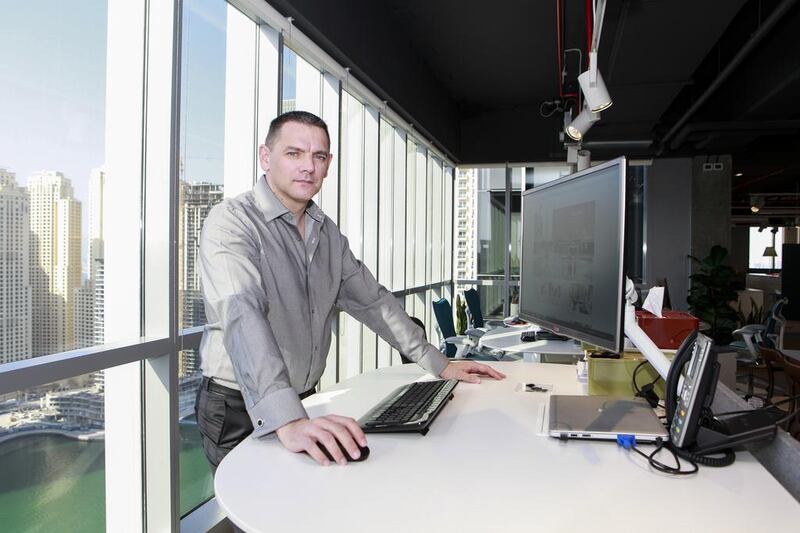UAE office workers spend longer at their desks now than five years ago, according to a recent survey - but with what real benefit to either their own health or the company's bottom line?
According to Herman Miller, a workplace design company, more than a third of men and a fifth of women in the UAE spend longer at their desks now than they did in 2010. But a similar figure say a poor working environment decreases their motivation and 45 per cent would prefer to work from home.
"Work-life balance can always be improved. The UAE, being a business hub, feels that even more: many of us are routinely dealing with the US, Europe and Asia, so time differences affect when we need to be available," says Rob Keddie, regional director for Herman Miller. "Many offices struggle to give employees the flexibility of work environments, to be able to cope with the wide variety of demands put on them."
John Vickerman, senior vice president for human resources at the broadcaster OSN, agrees. "Hours are quite long in the UAE - more like they were in the '80s and '90s in the UK - and people habitually work 48 to 60 hours a week. We want people to have balance."
At OSN, which employs 780 staff in the UAE, many workers use kneeling stools or bouncy balls after orthopaedic assessments, and the broadcaster is gradually replacing all workstations and chairs with ergonomic designs, with 400 new units due in the next few weeks.
The company offers eye and auditory tests for those employees regularly using screens or phones, as well as health screenings for blood pressure and diabetes - both of which Mr Vickerman says are "surprisingly high for normal, young, fit people" in the UAE.
Exercise classes are coming soon, new mothers get maternity leave in line with European standards of up to 26 weeks paid and a further six months unpaid, rather than the statutory UAE 45 days, and there is also paternity leave of five days. Flexi-hours, unpaid sabbaticals and part-time working are all considered, although Mr Vickerman says he would "like to see more in the UAE legislation for part-time workers".
Dabo & Co PR has taken a similarly proactive approach since moving to new offices in Dubai's Gold and Diamond Park a year ago. Camilla D'Abo, a co-founder and managing partner, says Dabo took inspiration from Google, widely cited as one of the best places to work, when designing its new space. Ms D'Abo says managers can work from home once a month and all of Dabo & Co's 60 staff, who normally work 8.30am to 5.30pm, can arrive and leave either an hour early or late on Sundays and Thursdays to get to the gym, have a lie-in or whatever else takes their fancy.
They run exercise classes in-house once a week and each area of the office has its own identity - the IT team works in the Garden Area, with turf for carpet and a cloud-painted ceiling, while private calls can be taken in London phone box- style booths.
Over at the recruiter site Bayt.com, named one of the top 10 places to work in the UAE for four years, its 330 employees receive a fitness allowance, which can go towards gym membership. Flexible timings and work-from-home policies are available, especially for working mothers.
"We don't believe in keeping our employees back beyond the stipulated work hours as we know the value of their personal lives," says Suhail Masri, vice president of sales.
Bayt.com's Mena survey shows that 88 per cent of respondents will change their job for one that gives a better work-life balance and that it is key to staff retention and productivity. Indeed, according to the human resources consultant Aon Hewitt the best employers have 33 per cent less staff turnover. Google famously offers staff free meals and snacks, as well as gym allowances, massage vouchers and exercise classes. The Dubai Internet City office also has quiet rooms, with calls and meetings banned, and a massage chair.
"We wanted a place where people can think and act like owners and entrepreneurs - people should be thinking outside the box and beyond just their core roles," says Joyce Baz, the head of communications for Google Mena.
Herman Miller has kitted out its Dubai Marina Plaza space as a "living office" for staff, visitors and clients, for activities from email to team huddles to video conferences, meetings or brainstorming sessions.
The workplace design company also offers employers the Locale desk - which at the push of a button allows the worker to sit for focused work or stand and collaborate with colleagues.
Even small companies that cannot afford an office overhaul can start somewhere; Ikea offers a standing laptop station for just Dh255. Or in milder weather do a Steve Jobs and take your team outside for a meeting on the move.
business@thenational.ae
Follow The National's Business section on Twitter
How progressive UAE employers are keeping workers happy with funky offices and benefits
With UAE office workers spending longer at their desks than they did five years ago, some companies are rolling out workplace wellbeing initiatives to improve the health of their staff.

Editor's picks
More from the national




